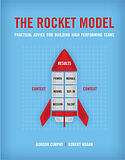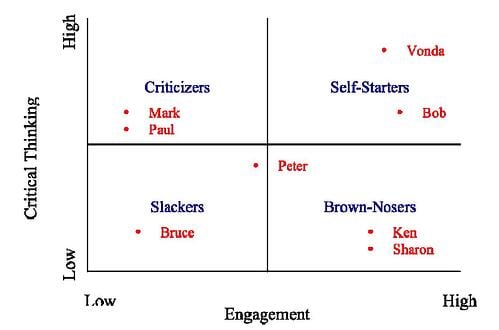 Results are the what of teamwork, whereas the seven components of the Rocket Model© are the how of teamwork. The relationship between Results and the components of the Rocket Model© is not perfect—some teams do well when they shouldn’t and vice versa. For example, a team may be dysfunctional but have great products or face weak competitors. Such teams, however, will fail when faced with strong competition. Other teams may lose even though they do everything right. Still others may achieve poor Results due to a single, underperforming component of the Rocket Model© (e.g. a team killer, the lack of resources, or poor accountability may prevent a team from winning). We believe that teams need to have at least moderate scores on all seven components of the Rocket Model© if they are to compete successfully.
Results are the what of teamwork, whereas the seven components of the Rocket Model© are the how of teamwork. The relationship between Results and the components of the Rocket Model© is not perfect—some teams do well when they shouldn’t and vice versa. For example, a team may be dysfunctional but have great products or face weak competitors. Such teams, however, will fail when faced with strong competition. Other teams may lose even though they do everything right. Still others may achieve poor Results due to a single, underperforming component of the Rocket Model© (e.g. a team killer, the lack of resources, or poor accountability may prevent a team from winning). We believe that teams need to have at least moderate scores on all seven components of the Rocket Model© if they are to compete successfully.
Effective and ineffective leaders differ in their ability to obtain superior Results. Most organizations are staffed with managers who don’t achieve Results; poor leaders are the biggest obstacles to team or group performance. A critical but often overlooked role of a leader is to teach the team how to win. Athletic team coaches and heads of military combat units tend to do this well – they evaluate the competition and devise strategies and tactics to defeat them. They define team member roles and responsibilities, make members practice, provide feedback and coaching, upgrade talent, and hold members accountable for performance.
Leaders can use three mechanisms to teach their teams how to win. First, set clear metrics and goals that are benchmarked against the competition. These goals might include market share, survey results, analysts’ recommendations, and customer complaints. Given the amount of data available to modern organizations, it is usually easy to find benchmarking information that teams can use to set winning goals.
Second, review team performance regularly. Periodic team scorecard reviews will help members understand where they are succeeding and where they are falling short. These reviews should include discussions about how to improve performance; leaders can also use this time to provide feedback and coaching on proposed solutions.
Third, teach members how to win by creating action plans. These action plans need to state the steps members must take to implement solutions, steps that eventually become roadmaps for winning. The best leaders capitalize on all three techniques to drive team performance.





